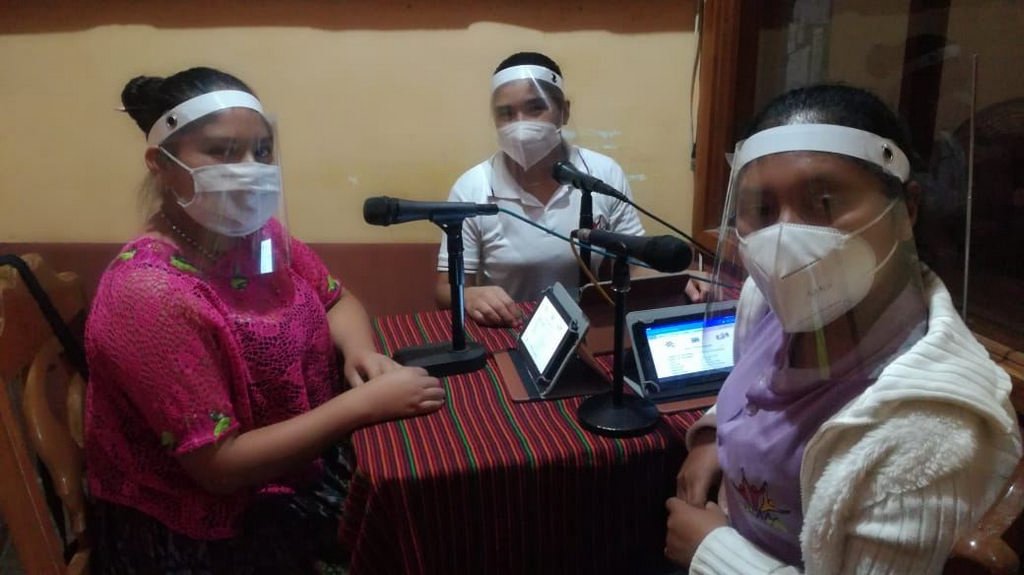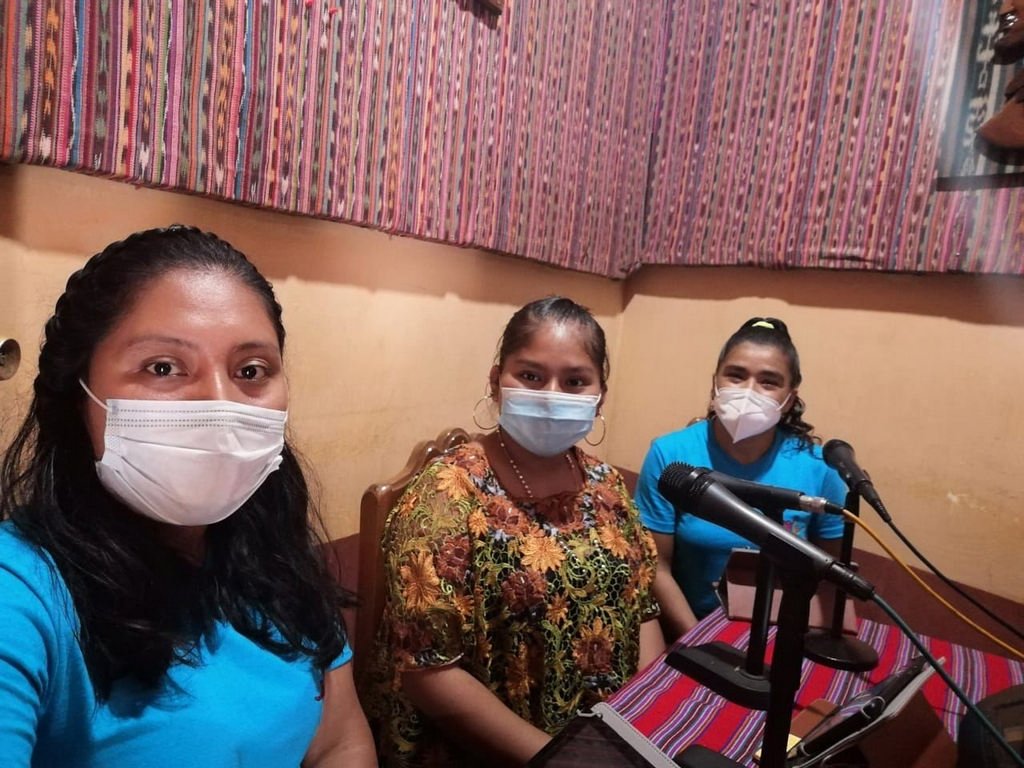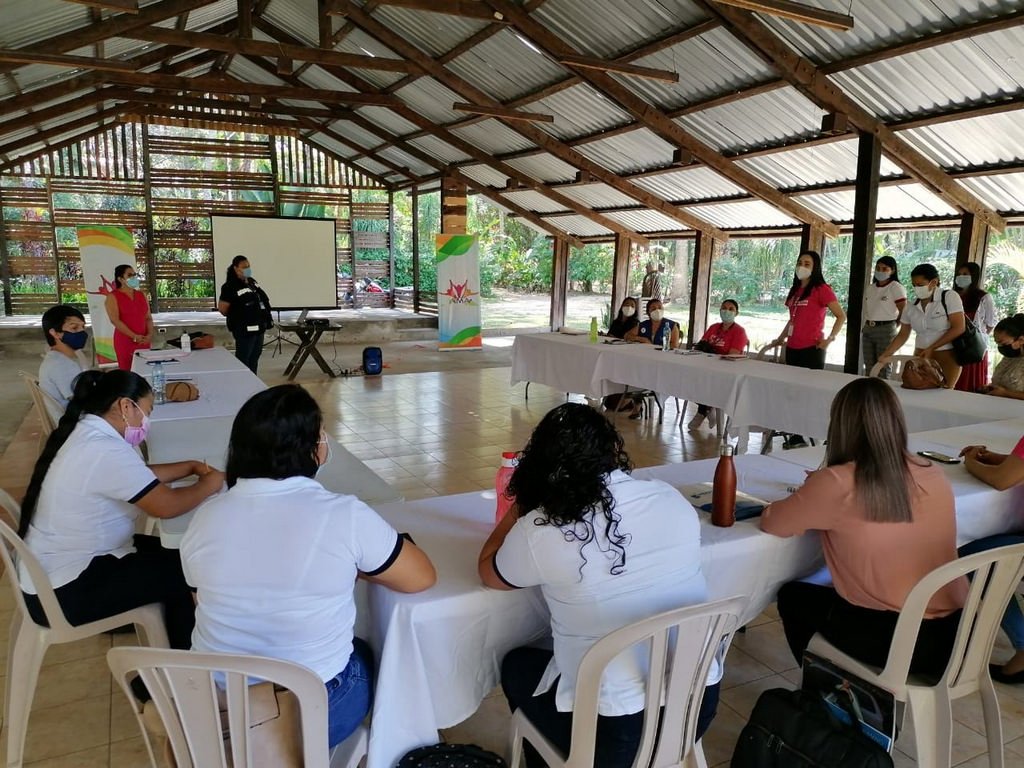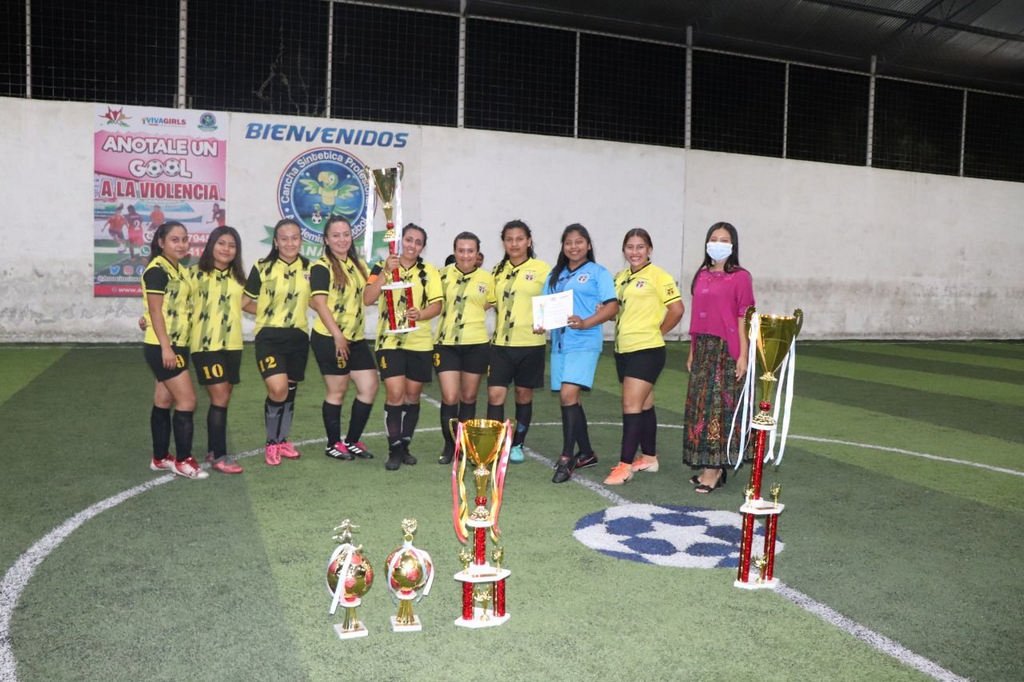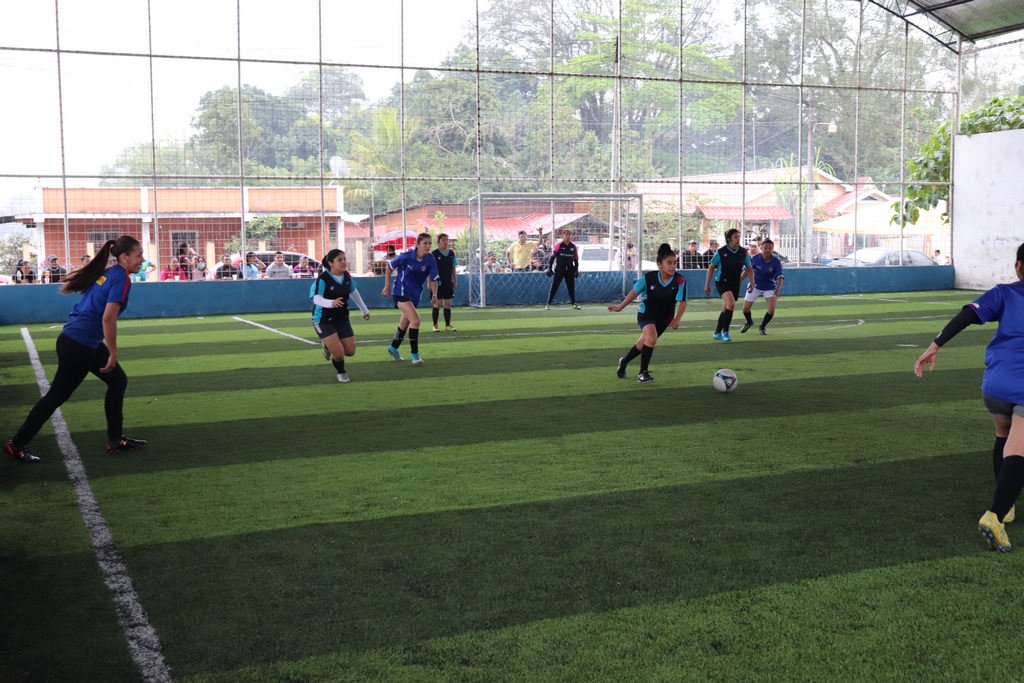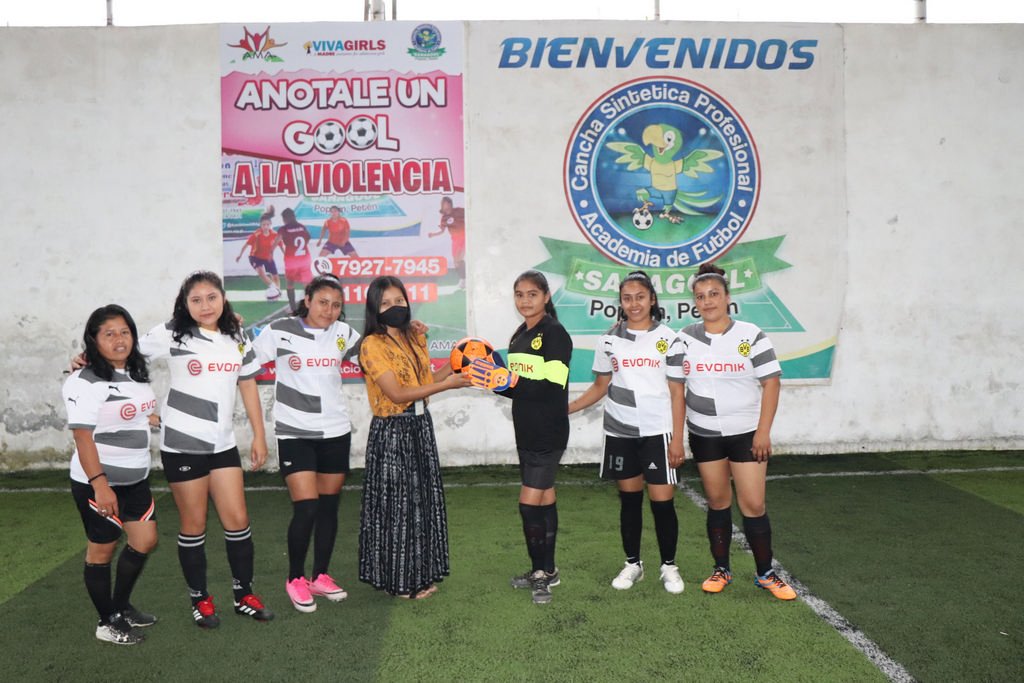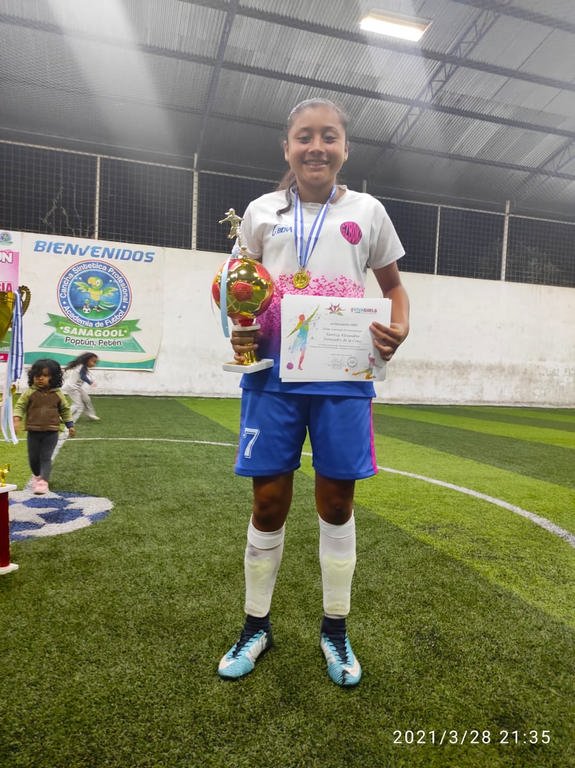
Project Name:
Empower Yourself, Make an Impact, and Stand Against Violence (2020 and 2021)
Start Date: May/2020
End Date: April/2021
85 volunteers
The project "Empower Yourself, Make an Impact, and Stand Against Violencewas developed within the framework of MADRE's VIVA Girls Initiative. As its launch was scheduled for the second quarter of 2020, coinciding with the arrival of COVID-19 in Guatemala, we needed to make some adjustments to it, since the fight for the human rights of adolescent girls had to continue in Guatemala with or without the pandemic.
In this context, we report that the initial proposal of the project included as its first component the execution of three interactive training camps with 50 adolescent girls from five Basic Education Institutes in the southern area of Petén, focusing on leadership, responsible sexuality, prevention of sexual violence, and early pregnancies. However, due to the emergency caused by Covid-19 and the restrictions imposed by the Guatemalan government, face-to-face activities were limited, which prevented the realization of the camps and other planned activities.
This did not prevent us from continuing with the project execution. Thanks to the flexibility in the development of activities by MADRE's VIVA Girls Initiative, the project was reformulated to develop 5 Interactive Training Circles with groups of 10 adolescent girls each, to avoid crowds and protect the health of participants and collaborators of AMA Association. This alternative worked well in place of the camps.
The Interactive Training Circles focused on Responsible Sexuality and Prevention of Sexual Violence, as violence and pregnancies among adolescent girls increased during the pandemic, making it necessary to empower them with more tools to prevent pregnancies and sexual violence and better face the challenges and difficulties that increased with the pandemic.
The circles were facilitated by the coordinator of the Adolescent Component of the national sexual and reproductive health program of the Petén Sur Oriente health area and project technicians from AMA, who used an interactive methodology that generated greater participation of the adolescent girls, making the teaching-learning process more dynamic and achieving a better understanding of the content.
Additionally, at that time, the epidemiological traffic light allowed us to carry out face-to-face activities with sanitation measures. Also, as the number of training days was reduced, the funds allocated for food and other expenses for the camps were used to provide food bags and hygiene kits to the 50 adolescent girls, thus helping to mitigate the negative effects on the economy caused by COVID-19 and the ETA and IOTA storms on Guatemalan families.
The training circles were conducted in the following basic education institutes: Tikajal neighborhood, San Luis; Ixobel neighborhood, Poptún; Nuevo del Carmen neighborhood, Dolores; San Juan El Chal village; Cooperative Nuevo Horizonte and Santa Ana, Petén.
Additionally, another interactive training circle was conducted with 25 adolescent girls from the AHICAM home, who are survivors of sexual violence. They were also given food bags and hygiene kits, as AHICAM still needs donations to survive. Thus, we not only empowered adolescent girls on responsible sexuality and violence prevention but also strengthened access to food, menstrual hygiene, and COVID-19 prevention.
Having a Zoom account, provided to AMA by the VIVA Girls Initiative, also worked very well. It allowed us to conduct more than 50% of the meetings of the Local Referral Network for Attention to Female Victims of Crime in Southern Petén virtually without interruption, as initially, they were conducted on the free platform, which required restarting the meeting every 45 minutes and sending a new link, often delaying the progress of the meeting and causing participants to disconnect.
The Network included the participation of 40 leaders delegated from different government and non-government institutions and organizations in Southern Petén, with the meetings aimed at joining efforts to provide a comprehensive response, tailored to the reality of the crime survivors.
The project also included 15 broadcasts of the Spanish-Maya Q´eqchi´ radio program “The ABC of Sexuality” on U´tan Kaj community radio, mostly listened to by the Maya Q´eqchi´ and mestizo indigenous population of rural and marginal urban areas of Guatemala. This program has an open forum format for young women to openly discuss topics of responsible sexuality and COVID-19 prevention. Additionally, broadcasts started to be made through Facebook Live on the FanPage of AMA Association, reaching adolescent girls and young women in urban areas.
Broadcasting the program bilingually worked very well, as it allowed adolescent girls to receive information in their language, encouraging them to communicate more confidently with the program to resolve their doubts.
Broadcasting on Facebook Live innovated the ways in which AMA Association transfers capacities and carries out advocacy, reaching more adolescent girls, especially from marginal urban areas of the urban centers of Petén, Izabal, Quiché, Baja, and Alta Verapaz departments, where there is also a high rate of pregnancies and sexual violence. Thus, transmitting information related to their Sexual and Reproductive Rights was important and worked very well during the project.
Changing the start dates of the "Score a Goal Against Violence"women's soccer championshipworked out wonderfully, allowing it to be held without any issues and strengthened the participation of the teams. The young women participants took it as a space to assert their rights, escape the stress caused by the pandemic confinement, and distance themselves from the violence and inequalities they experience at home.
During the championship, 100 adolescent girls and young women from Southern Petén participated. During the matches, important data about sexual violence and early pregnancies were shared, and the Fair Play team was awarded, as one of the objectives of this activity was to promote fair play and sisterhood among women.
At the end of the project, we will have contributed to reducing the rates of sexual violence and pregnancies in adolescent girls and young women in Southern Petén, Guatemala.
Activities 2020-2021
- Six Interactive Training Circles
Se realizaon seis círculos de Formación Interactiva para 75 adolescentes Maya Q’eqchi’ y Mestizas, comprendidas entre los 13 a 16 años de edad de cinco Institutos de Educación Básica del Sur de Petén y de la Casa Hogar AHICAM.
- 15 Bilingual Spanish-Maya Q´eqchi´ Radio Programs "The ABC of Sexuality"
Three young women broadcasters from AMA, Maya Q’eqchi’ and Mestizo, aged between 21 and 27 years
- Eight Meetings with the Local Referral Network for Victims of Crime in Southern Petén
Se realizaron ocho reuniones con 40 funcionarias y lideresas comunitarias Maya Q’eqchi’ y mestizas que integran la Red de Derivación Local de Víctimas del Delito del Sur de Petén.
- One Women's Soccer Championship "Score a Goal Against Violence"
Se realizó un campeonato con la participación de 100 niñas adolescentes y mujeres jóvenes Maya Q’eqchi’ y mestizas de diez equipos de fútbol del Sur de Petén, comprendidas entre las edades de los 15 a los 29 años de edad.
- One Self-Care and Relaxation Workshop with Members of the Local Referral Network for Victims of Crime in Southern Petén
Se realizó un taller de autocuidado y relajación con 40 funcionarias y lideresas comunitarias Maya Q’eqchi’ y mestizas que integran la Red de Derivación Local de Víctimas del Delito del Sur de Petén.
- Six Interactive Training Circles
Se realizaron círculos de formación con 500 niñas adolescentes Maya Q’eqchi’ y Mestizas, comprendidas entre los 10 a 16 años de edad de comunidades y zonas urbanas marginales, con quienes realizaron la réplica de lo aprendido las 50 estudiantes de los cinco institutos de educación básica.
- Fifteen Bilingual Spanish-Maya Q'eqchi´ Radio Programs "The ABC of Sexuality"
El programa radial «El ABC de la Sexualidad» tuvo un alcance de 3,000 niñas adolescentes y mujeres jóvenes de comunidades y zonas urbanas marginales del Sur de Petén, radioescuchas y conectadas al programa vía radial y por Facebook Live.
- Eight Meetings with the Local Referral Network for Victims of Crime in Southern Petén
Fueron cerca de 400 niñas adolescentes y mujeres jóvenes Maya Q’eqchi’ y Mestizas, beneficiadas con las acciones que realiza la Red de Derivación Local de Víctimas del Delito del Sur de Petén.
- One Women's Soccer Championship "Score a Goal Against Violence"
Cerca de 400 niñas adolescentes y mujeres jóvenes Maya Q’eqchi’ y mestizas que presenciaron los partidos del campeonato y fueron sensibilizadas con los mensajes de empoderamiento, prevención de la violencia, violencia de género, los embarazos tempranos, la violencia sexual, el feminicidio, la misoginia y también, sobre cómo el deporte ayuda a ser niñas adolescentes y mujeres empoderadas y saludables, que se difundían durante el torneo.
Volunteering:
Se tuvieron de voluntarias 175 adolescentes y mujeres jóvenes Maya Q’eqchi y Mestizas de comunidades rurales de los municipios de San Luis, Poptún, Dolores, El Chal y Santa Ana y Petén.
- Más de 675 niñas adolescentes y mujeres jóvenes Maya Q’eqchí y Mestizas se encuentran empoderadas para prevenir los embarazos tempranos y la violencia sexual.
- 3,000 adolescent girls and young women, Maya Q’eqchí and Mestizo, are sensitized about the importance of civic participation, exercising their sexual and reproductive rights, and preventing sexual violence.
- A cooperation agreement was signed between the AMA Association and the Office for Victim Attention of the Public Prosecutor's Office of Poptún, Petén. This has formalized and brought a closer relationship with this entity, which coordinates the Local Referral Network for Victims of Crime in Southern Petén, strengthening the development of the Network's meetings and the leadership that AMA has started to have in it.
- An alliance was established with the Secretariat Against Violence, Exploitation, and Human Trafficking (SVET) of Petén, with whom educational material for the prevention of violence, exploitation, and human trafficking has been provided, which we have delivered to the adolescent girls participating in our programs.
- Also, as part of the alliance, the AMA Association participated in the dialogue with the Vice President of the Republic of Guatemala with youth and the creation of the SVET Network of Northern Petén.
- During the dialogue, there was an opportunity for direct interaction with the Vice President, where we requested support for the reactivation of the Petén Departmental Technical Table for the National Plan for the Prevention of Adolescent Pregnancies (PLANEA), as this space has been strengthened by AMA, but since November 2020, it has not been possible to follow up, as the Ministry of Health and Ministry of Education have postponed the dates. It is worth mentioning that PLANEA is led by the Vice Presidency of the Republic.
- We continue to follow up on the request, as a new meeting of PLANEA in Petén has not yet been held. Our advocacy work is constant as the responsible public entities often delay the development of activities, but we are aware that it is part of the work and challenges we face.
Sexual violence and pregnancies among adolescent girls and young women are increasing problems in Guatemala, and the communities of Southern Petén are no exception (Municipalities of San Luis, Poptún, Dolores, El Chal, and Santa Ana).
As a result, the National Observatory of Sexual and Reproductive Health – OSAR – reports that from January to October 2019, there were 114,858 pregnancies among indigenous and mestizo girls and adolescents aged 10 to 19 years, of which 5,061 correspond to girls between 10 to 14 years, an age where they are typified as Victims of Sexual Violence.
For the same period in Petén, OSAR reports 3,685 pregnancies among girls and adolescents aged 10 to 19 years, of which 177 correspond to sexual violence crimes as they are girls aged 10 to 14 years.
In Southern Petén, there are 1,070 pregnancies among girls and adolescents aged 10 to 19 years, of which OSAR reports that 41 correspond to girls aged 10 to 14 years.
The donor who funded this project













